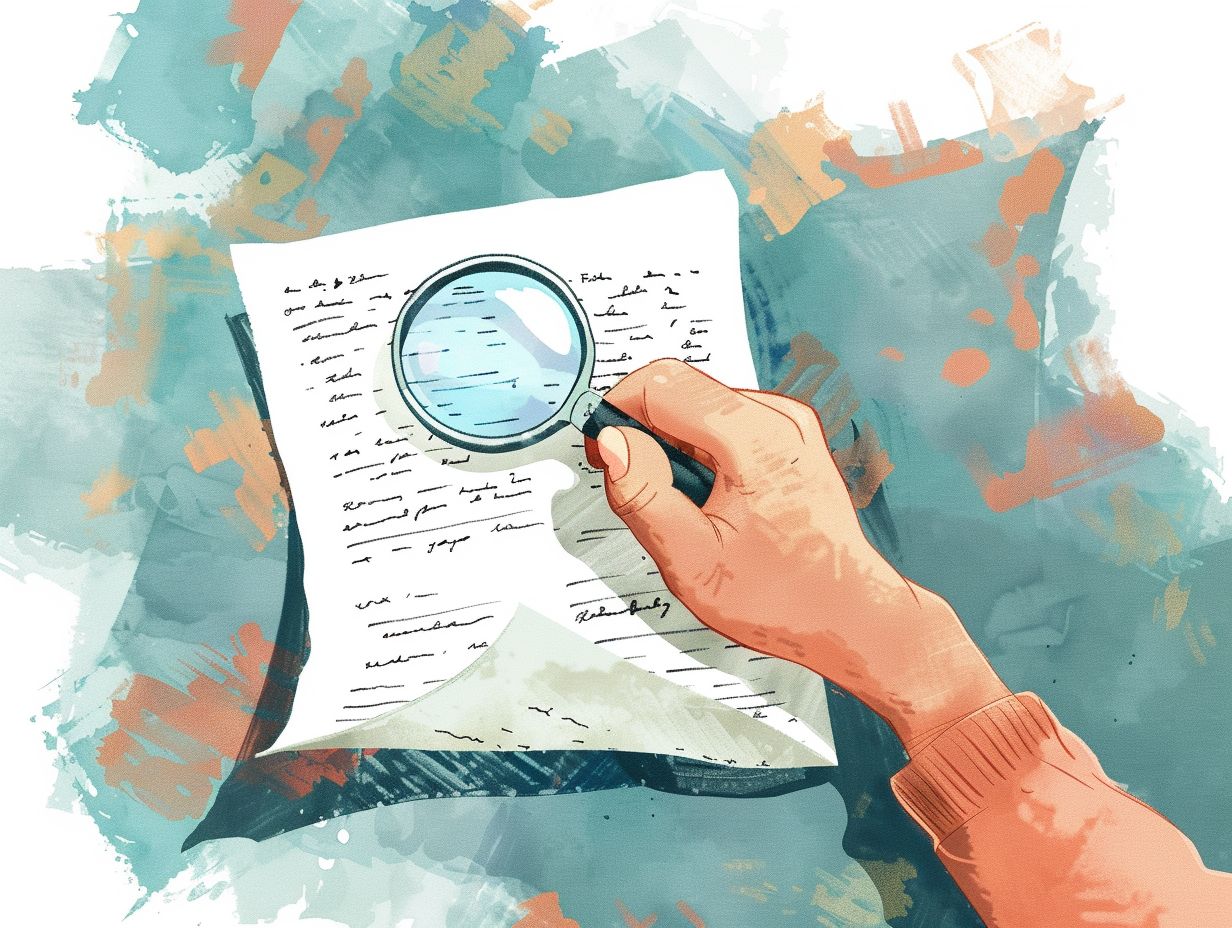Are you a job seeker in Florida wondering about employment background checks? In this comprehensive article, we cover everything you need to know. From the importance of these checks to the information included, laws and regulations, and what employers can look for, we’ve got you covered. We also discuss the rights of job applicants, how to prepare for background checks, what to do in case of errors, and how to handle adverse actions. Stay tuned for all the valuable insights!
Key Takeaways:

- Employment background checks are important for employers to ensure a safe and qualified workforce.
- Florida has specific laws and regulations for employment background checks, including the Fair Credit Reporting Act and Ban the Box Law.
- Job applicants should prepare for background checks by checking their own background, gathering necessary documents, and being honest and transparent.
Why Are Employment Background Checks Important?
Employment background checks play a crucial role for employers by aiding in compliance with state regulations and enabling informed hiring choices through the verification of qualifications and criminal records of prospective candidates.
Thorough background checks also help employers in protecting their organization from potential liabilities linked with negligent hiring, like workplace violence, theft, or fraud. By confirming the backgrounds of potential employees, employers can establish a safe and secure work atmosphere for their current staff and clients.
Background checks can uncover any inconsistencies in a candidate’s resume or employment history, enabling employers to authenticate the accuracy of the information provided during the recruitment process.
What Information Is Included in Employment Background Checks?
Employment background checks commonly encompass a range of information, including criminal records, employment history, and education verification, in order to conduct a thorough evaluation of the candidate.
1. Criminal Records
Criminal records in employment background checks provide employers with information about a candidate’s criminal history, including any public records of arrests, convictions, and other legal issues. These records are typically obtained from local, state, and federal databases by conducting a thorough background check on the individual.
The importance of criminal records lies in helping employers make informed decisions about the trustworthiness and reliability of potential employees. By accessing public records, employers can verify a candidate’s honesty and integrity, ensuring a safe work environment for all staff members.
Background checks are crucial for safeguarding the company’s reputation and assets, as they help identify any potential risks or liabilities associated with hiring a particular individual.
2. Employment History
Verification of employment history ensures the accuracy of a candidate’s previous job titles, employers, and duration of employment to confirm the validity and consistency of the information provided.
This verification process is essential for employers to make well-informed hiring choices as it aids in evaluating the candidate’s qualifications and work experience. Various methods, such as direct contact with previous employers, examination of W-2 forms or pay stubs, and background checks, are utilized for verification.
Discrepancies in employment history may signal warning signs to recruiters, suggesting a potential lack of honesty or integrity on the candidate’s part. Such disparities could result in a reassessment of the hiring decision or even the withdrawal of a job offer to mitigate any risks associated with hiring a deceitful individual.
3. Education and Credentials
Education and credentials verification in employment background checks ensure that the candidate has the necessary qualifications, such as degrees from institutions like the University of Florida, for the position.
This verification process involves confirming the authenticity of academic records, including degrees earned, certifications obtained, and institutions attended. Employers often contact the educational institutions directly or utilize third-party verification services to validate the information provided by the candidate.
Verifying academic credentials is crucial as it helps employers make informed hiring decisions and ensures that the individual possesses the required knowledge and skills for the job. False educational claims can have serious repercussions, leading to mistrust between employers and employees, impacting productivity, and tarnishing the reputation of both the individual and the organization.
4. Credit History
Credit history checks, which are carried out by a consumer reporting agency, offer employers valuable insights into a candidate’s financial habits and adherence to financial commitments, particularly for roles involving financial responsibilities. These checks enable employers to evaluate a candidate’s capacity to handle financial obligations, honor agreements, and manage sensitive financial data.
The information obtained from credit history checks assists employers in assessing a candidate’s reliability and honesty, especially in positions involving company finances or client accounts. It also aids in ensuring that the chosen candidate aligns with the organization’s values and can maintain confidentiality.
Conducting credit history checks is essential to comply with legal mandates like the Fair Credit Reporting Act (FCRA) to safeguard candidate rights and promote transparency in the hiring process.
What Are the Laws and Regulations for Employment Background Checks in Florida?
Employment background checks in Florida are regulated by a variety of laws and regulations, such as the Fair Credit Reporting Act (FCRA), state-specific legislation, and local ordinances, all aimed at promoting fair and legal screening practices.
1. Fair Credit Reporting Act (FCRA)
The Fair Credit Reporting Act (FCRA) governs how consumer reporting agencies gather, utilize, and reveal information about candidates to ensure compliance with federal laws in employment background checks. Consumer reporting agencies play a vital role in verifying the accuracy and validity of information provided in background checks.
According to the FCRA, candidates have specific rights, including the right to challenge inaccurate information in their reports, the right to be informed when adverse actions are taken based on these reports, and the right to receive a complimentary copy of their report once every 12 months from each consumer reporting agency.
These provisions aim to safeguard the interests of candidates and encourage fair and precise reporting practices in the employment screening process.
2. Florida Civil Rights Act
The Florida Civil Rights Act prohibits discrimination in employment practices, ensuring that background checks are conducted fairly and in compliance with state laws to protect candidates’ rights.
Employers in Florida are mandated to adhere to the provisions outlined in the Act, which prohibits discrimination based on race, color, religion, sex, national origin, age, disability, or marital status. This ensures that candidates are evaluated solely on their qualifications, skills, and experience during the hiring process.
By following these guidelines, employers can create a more diverse and inclusive work environment, fostering equal opportunities for all individuals. The Act imposes penalties on organizations that violate these non-discriminatory practices, promoting accountability and fair treatment in the workplace.
3. Florida Ban the Box Law
The Florida Ban the Box Law prohibits employers from inquiring about a candidate’s criminal records on initial job applications. This regulation aims to promote fairer hiring practices and ensure adherence to state laws.
The primary goal of this legislation is to offer individuals with prior criminal convictions an equal chance to obtain employment by eliminating potential biases in the early stages of the hiring process. By delaying inquiries about criminal history until later in the hiring process, employers can concentrate on assessing a candidate’s qualifications and abilities first.
Despite promoting inclusivity and minimizing discrimination, employers are still required to conduct background checks at a subsequent stage to guarantee workplace safety and security.
Employers can navigate these obligations by establishing consistent background screening policies that align with state regulations and federal laws like the Fair Credit Reporting Act (FCRA).
Providing transparent communication to candidates regarding the background check procedures and obtaining their consent before proceeding are crucial steps in upholding transparency and compliance.
What Can Employers Look for in Background Checks in Florida?
Employers typically conduct background checks in Florida to evaluate various aspects such as criminal records, employment history, education verification, and other qualifications. These checks are crucial in assessing a candidate’s credibility and suitability for a specific role.
Examining a candidate’s criminal records helps employers ensure workplace safety and security. Verification of employment history validates a candidate’s professional experience and skills, offering insights into their work ethic and reliability.
Education verification is essential to confirm the qualifications claimed by the candidate, ensuring they possess the necessary knowledge and expertise for the job.
These comprehensive checks aid employers in making informed decisions and selecting the most qualified individuals for their organization.
What Are the Rights of Job Applicants in Employment Background Checks?
Job applicants are granted specific rights under the FCRA and other laws during employment background checks, guaranteeing transparency, accuracy, and compliance in the hiring process.
These rights encompass the right to be notified about the background check process, the right to provide consent before any information is collected, and the right to challenge any inaccuracies discovered in the report.
It is essential for employers to comply with these rights to uphold fairness and legal standards. By making sure that job applicants are informed about and can exercise their rights, companies can build trust, enhance a positive candidate experience, and reduce the risk of potential legal complications.
How Can Job Applicants Prepare for Employment Background Checks?
Job applicants should prepare for employment background checks by proactively checking their own background, gathering necessary documents, and being honest and transparent during the hiring process.
1. Check Your Own Background
Before applying for a job, it can be advantageous for candidates to conduct their own background screenings using services like GoodHire to identify any potential issues with their criminal history or other records.
By proactively self-checking their background, candidates can ensure the accuracy of their information and address any discrepancies before the official background check by the employer.
This not only demonstrates a sense of responsibility and transparency but also allows candidates to be prepared to address any concerns that may arise during the hiring process.
These self-screening tools provide individuals with the opportunity to review their own records, correct any inaccuracies, and present themselves in the best possible light to potential employers.
2. Gather Necessary Documents
Collecting essential documents, such as employment history records and education verification, can help ensure a smooth background check process that accurately reflects the candidate’s qualifications.
Candidates should also gather relevant certifications, licenses, and professional memberships when getting ready for a background check. These documents offer a comprehensive overview of the candidate’s professional journey and further validate their skills and expertise.
Submitting a complete set of documents demonstrates transparency and reliability to potential employers, helping to establish trust during the hiring process. Keeping these records easily accessible streamlines the verification process, speeds up the overall background check procedure, and enhances the likelihood of a successful outcome.
3. Be Honest and Transparent
It is important to be honest and transparent about one’s criminal history and other aspects of the background check. This helps to establish trust with potential employers and prevents any unexpected issues during the screening process.
Employers value integrity and openness, considering candidates who openly share relevant information to be more dependable and trustworthy. Transparency contributes to a positive employer perception, indicating a candidate’s adherence to rules and commitment to upholding company values.
Conversely, withholding or falsifying information can have serious consequences, harming a candidate’s reputation and impacting future job opportunities. Dishonesty undermines trust and could lead to termination or legal actions if the deception is uncovered after being hired.
What to Do If There Are Errors in Your Employment Background Check?
In case of errors in an employment background check, it is essential to promptly reach out to the consumer reporting agency responsible for the report to ensure adherence to regulations and accuracy.
- The initial step involves acquiring a copy of the background check report from the agency.
- Thoroughly examine the report to pinpoint any inaccuracies or disparities.
- Subsequently, assemble supporting documents or evidence that substantiate the errors in the report.
- Upon gathering the evidence, communicate with the reporting agency in written form to challenge the inaccuracies.
- Include precise details about the errors and present documentation to bolster your assertions.
- It is vital to follow up with the agency to ensure that the necessary corrections are implemented promptly.
- Precision in background checks is critical for compliance purposes and to avert any negative repercussions on your employment prospects.
How to Handle Adverse Action Based on Employment Background Checks?
Dealing with adverse action stemming from employment background checks involves understanding FCRA rights and the necessary steps employers need to follow before finalizing a hiring decision.
When an employer is contemplating taking adverse action based on information from background checks, they must, by law, furnish the candidate with a preliminary notice.
This notice should encompass a copy of the report that prompted the potential adverse action, offering the candidate an opportunity to review and contest any inaccuracies. It is essential for candidates to recognize their right to challenge the information and provide any additional relevant details that could influence the ultimate decision.
Employers should then conduct a fair investigation, taking into account any disputed information before reaching a final hiring decision in compliance with FCRA regulations.
Frequently Asked Questions
What is the purpose of an employment background check in Florida?
An employment background check in Florida is conducted to verify the accuracy of information provided by job applicants and to ensure that they are suitable for the job. It helps employers make informed decisions about potential employees and protect their business from any potential risks.
What information is included in an employment background check in Florida?
An employment background check in Florida typically includes a criminal record check, employment history verification, education verification, and credit check. Additional information such as driving record, professional licenses, and drug testing may also be included depending on the job requirements.
Is it legal for employers to conduct employment background checks in Florida?
Yes, it is legal for employers to conduct employment background checks in Florida. However, they must comply with federal and state laws, such as the Fair Credit Reporting Act (FCRA) and the Florida Civil Rights Act, which protect job applicants from discrimination and ensure that the background check is conducted fairly.
How far back can employers look into an applicant’s criminal history in Florida?
In Florida, employers can typically only consider criminal convictions from the past seven years. However, there are exceptions for certain types of jobs, such as law enforcement or healthcare, where a more extensive background check may be necessary.
Can an applicant in Florida be denied a job based on their criminal history?
It depends on the nature of the job and the severity of the criminal offense. Employers in Florida must follow the guidelines set by the Equal Employment Opportunity Commission (EEOC) and the Florida Commission on Human Relations (FCHR) to ensure that their hiring decisions are not discriminatory.
What should I do if I believe there is an error in my employment background check in Florida?
If you believe there is an error in your employment background check in Florida, you have the right to dispute the information and request a re-investigation. You can also contact the FCRA or the FCHR for assistance in resolving any issues with your background check.

























Rate this article:
Average rating 0 / 5. Vote count: 0
No votes so far! Be the first to rate this post.
No Comments yet!